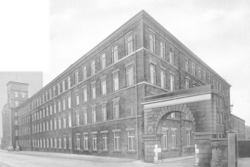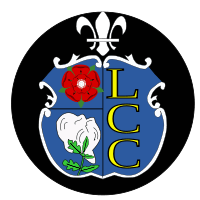Foxsons Mill, Staincliffe
Foxsons Mill, Staincliffe was a doubling mill in Dewsbury, West Yorkshire. It was Lancashire Cotton Corporation sole mill in West Yorkshire. A doubling mill, it doubled yarns of count's 4's to 40's. built in It was taken over by the Lancashire Cotton Corporation in the 1930s and passed to Courtaulds in 1964. The mill was demolished in 1973, and the land is now housing.
 | |
 Location within West Yorkshire | |
| Cotton | |
|---|---|
| Doubling mill | |
| Location | Staincliffe, Dewsbury |
| Further ownership |
|
| Coordinates | 53.7043°N 1.6489°W |
| Construction | |
| Demolished | 1973c1973 |
| References | |
| [1] | |
Location
Staincliffe is part of the West Yorkshire Urban Area 2.4 km north of Dewsbury which is in the Calder valley. It is situated between a number of larger towns and cities. Halifax is 13 km upstream to the west, Leeds and Bradford lie eight miles to the north, Huddersfield lies eight miles to the south west, and Wakefield some six miles east.
Geologically, the town is situated on rock dated to the Carboniferous Period, consisting of coal measures and gritstones. Quaternary Period rock, glacial deposits and gravels exist in the Calder Valley. Coal, stone and gravel have all been exploited commercially.
Foxson's mill was on the Halifax road out of Staincliffe.
History
The industry peaked in 1912 when it produced 8 billion yards of cloth. The great war of 1914- 1918 halted the supply of raw cotton, and the British government encouraged its colonies to build mills to spin and weave cotton. The war over, Lancashire never regained its markets. The independent mills were struggling. The Bank of England set up the Lancashire Cotton Corporation in 1929 to attempt to rationalise and save the industry.[2] Foxsons Mill, Staincliffe was one of 104 mills bought by the LCC, and one of the 53 mills that survived through to 1950.
Architecture
This was a F. W. Dixon Mill.
Owners
- Lancashire Cotton Corporation (1930's-1964)
- Courtaulds (1964-
See also
- Textile manufacturing
- Cotton Mill
References
Bibliography
- Dunkerley, Philip (2009). "Dunkerley-Tuson Family Website, The Regent Cotton Mill, Failsworth". Archived from the original on 2008-03-23. Retrieved 2009-01-09.
- LCC (1951). The mills and organisation of the Lancashire Cotton Corporation Limited. Blackfriars House, Manchester: Lancashire Cotton Corporation Limited.
- Roberts, A S (1921), "Arthur Robert's Engine List", Arthur Roberts Black Book., One guy from Barlick-Book Transcription, archived from the original on 2011-07-23, retrieved 2009-01-11

